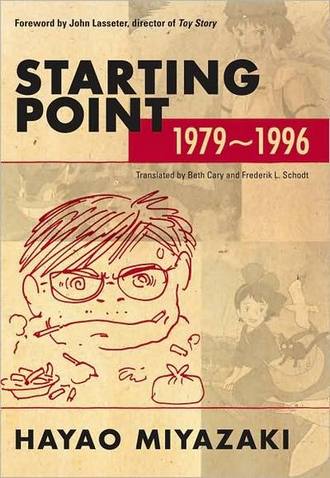Hayao Miyazaki's Starting Point: 1979-1996
By Leroy Douresseaux
August 14, 2009 - 08:20
Viz Media
Writer(s): Hayao Miyazaki, Beth Cary Frederik L. Schodt
Penciller(s): Hayao Miyazaki
Cover Artist(s): Hayao Miyazaki
ISBN: 978-1-4215-0594-7
$29.99 US, $34.99 CAN, 461pp, B&W with some color, hard cover
 |
| Starting Point: 1979-1996 cover image is courtesy of barnesandnoble.com. |
Starting Point: 1979-1996 is a collection of the writings of venerated animation director Hayao Miyazaki. Originally published by Tokuma Shoten in Japan, this is the first English publication of the book.
Born in Tokyo, Japan in 1941, Miyazaki first came to prominence as a director of feature-length animated films in the 1980s. By the turn of the 21st century, his following in America began to grow beyond a cult following, and he also won an Oscar for his film, Spirited Away. His most recent animated film, Ponyo, just received its U.S. and Canadian theatrical release.
Starting Point is a lot of everything. Originally published as Shuppatsuten 1979-1996 in July 1996, Starting Point is a collection of essays, interviews, conversations, and memoirs. Miyazaki talks about his childhood and his influences. He also writes about his career in great detail, from its beginnings in the early 1960s to the mid-90s as he began work on Princess Mononoke.
Reading Starting Point, I was surprised to discover that a man known for drawing stories was so good with words and so articulate, thoughtful, and philosophical. My immediate reaction was surprise at how he managed to seemingly talk about practically everything related to life in the entertainment business and life as a working artist. These writings (many of which appeared in various publications as essays, articles, or interviews) dissect animation theory, technique, and practice; animation as a career, a profession, and as an art; animation as a business; and animation as a factory made product for television. In these essays, Miyazaki is not afraid to take on and criticize things that are accepted or sacred.
He writes critically about the Fleischer Studios. He describes the animators there as going “through a masturbatory period of creating Fleischer’s Superman…,” but he writes this as someone who believes that the people at the studio were not maximizing their talents. Miyazaki writes about the absence of art in the film Fantastic Planet. His essay, “I Parted Ways with Osamu Tezuka When I Saw the ‘Hand of God’ in Him,” is a rebuke of gratitude concerning the legendary manga-ka and animation director who was an influence on Miyazaki. It’s an essay that would give Superman pause.
This book includes a section of planning notes for several of his films, Miyazaki manga, and a biographical chronology, among other things. Walt Disney and Pixar Animations Studios Chief Creative Officer, John Lasseter writes this book’s foreword. Like any Hayao Miyazaki book, Starting Point: 1979-1996 belongs on the shelves of lovers and practitioners of animation and filmmaking in general, because Miyazaki’s theories and advice will serve any filmmaker well.
Related Articles:
VIZ Media Announces Miyazaki's "The Art of Princess Mononoke"
VIZ Media Releases Miyazaki's "The Wind Rises" Art Book
VIZ Media Announces "Turning Point" from Hayao Miyazaki
Miyazaki's "My Neighbor Totoro" Blu-ray-DVD
Miyazaki's Oscar-Nominated "Howl's Moving Castle"
Miyazaki’s Howl’s Moving Castle
ToonSeum Screens Miyazaki Films
Miyazaki's 'Mr. Dough and the Egg Princess' at Tokyo's Ghibli Museum
Miyazaki Considers Porco Rosso Film Sequel
"I Wouldn't Like 3D Miyazaki"
